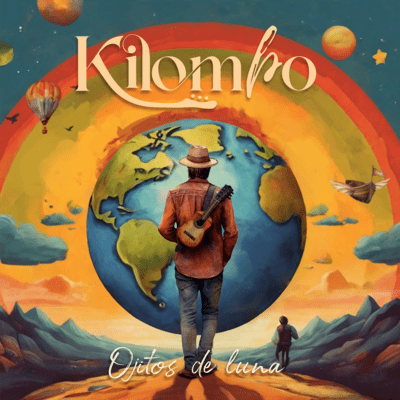

Para bailar la bamba
Para bailar la bamba
Se necesita una poca de gracia
Una poca de gracia y otra cosita
¡Y arriba y arriba!
¡Ay, arriba y arriba!
Arriba iré
Por ti seré
Por ti seré
En mi casa me llaman
En mi casa me llaman el inocente
Porque voy con chamacas
Porque voy con chamacas
De quince a veinte
¡Ay, arriba y arriba!
¡Ay, arriba y arriba!
Arriba iré
¡Bamba, bamba!
¡Bamba, bamba!
¡Bamba, bamba!
¡Bamba, bamba!
¡Ay! Una vez que te dije
Una vez que te dije que eras bonita
Se te puso la cara
Se te puso la cara coloradita
¡Ay, arriba y arriba!
¡Ay, arriba y arriba!
Y arriba iré
Por ti seré
Por ti seré
Yo no soy marinero
Yo no soy marinero, soy capitán
Soy capitán
¡Soy capitán!
¡Dale flauta!
¡Dale flauta!
¡Dale flauta!
¡Dale flauta!
Eisen heißen!
Heißen heißen!
Eisen heißen!
Heißen heißen!
¡Este sí es un son! (¡Kilombo!)
¡Este sí es un son!
¡Este sí es un son! (¡Kilombo!)
¡Este sí es un son!
¡Ay Kilombo, Kilombo, Kilombo!
El sombrero me lo quito y me lo pongo
¡Ay Kilombo, Kilombo, Kilombo!
El sombrero me lo quito y me lo pongo
Para subir al cielo
Para subir al cielo se necesita una escalera grande
Una escalera grande y otra cosita
¡Y arriba y arriba!
¡Ay arriba y arriba!
¡Y arriba iré!
Yo no soy marinero
Yo no soy marinero, soy capitán
Soy capitán
¡Soy capitán!
En mi casa me llaman
En mi casa me llaman el cachalote
Porque cacha que veo
Porque cacha que veo me doy el lote
¡Ay arriba y arriba!
¡Ay arriba y arriba!
Y arriba iré
Por ti seré
Por ti seré
¡Ay! Qué bonita la bamba
Y qué bonita la bamba en la madrugada
Cuando todos la bailan
Cuando todos la bailan en la enramada
Y arriba y arriba
¡Arriba arriba!
¡Y arriba iré!
Yo no soy marinero
Yo no soy marinero, soy capitán
Soy capitán
¡Soy capitán!
¡Bamba, bamba!
¡Bamba, bamba!
¡Bamba, bamba!
¡Bamba, bamba!
¡Bamba, bamba!
¡Bamba, bamba!
¡Bamba, bamba!
Y que se acabe la bamba
Que se acabe la bamba, por compasión
¡Ay, te pido y te pido!
¡Ay, te pido y te pido!
Te pido, amor
Que se acabe la bamba
Que se acabe la bamba
Venga otro son
¡Ay, y arriba y arriba!
Arriba y arriba
¡Y arriba iré!
Yo no soy marinero
Yo no soy marinero, soy capitán
Soy capitán
¡Soy capitán!
¡Bamba, bamba!
¡Bamba, bamba!
¡Bamba, bamba!
¡Bamba, bamba!
¡Bamba, bamba!
¡Bamba, bamba!
- Lyricist
Mexican Folk Song, Jorge Diaz Rodriguez, Luis Sartor, Sebastian Buitrago Alzate
- Composer
Mexican Folk Song, Jorge Diaz Rodriguez, Luis Sartor, Sebastian Buitrago Alzate
- Producer
Kilombo, Eric Rodriguez
- Recording Engineer
Eric Rodriguez
- Mixing Engineer
Eric Rodriguez
- Mastering Engineer
Haruo Saitoh
- Guitar
Sebastian Buitrago Alzate
- Vocals
Jorge Diaz Rodriguez, Luis Sartor
- Flute
Moises Zamora Perez
- Percussion
Hiroshi Augusto Duque Cafarzuza
- Other Instruments
Luis Sartor

Listen to La Bamba by Kilombo
Streaming / Download
- 1
Ojitos De Luna
Kilombo
- 2
Canario
Kilombo
- 3
Selele
Kilombo
- 4
Mamaquena
Kilombo
- 5
Izu Shichitō
Kilombo
- 6
Basta
Kilombo
- ⚫︎
La Bamba
Kilombo
The Sound of Kilombo's Cultural Fusion
Kilombo's "Ojitos De Luna" is a vibrant testament to the fusion of Latin American folklore with contemporary global influences, shaped by the band's deep connection to both their heritage and their long-standing presence in Japan. Rooted in the rhythms of Andean sounds, Afro-Latin rhythms, cumbia, and elements of rock, jazz, and global music, and Latin American traditions, the album expands its soundscape with elements of rock, jazz, and modern world music, creating a unique style.
More than just a collection of songs, "Ojitos De Luna" embodies Kilombo's artistic identity - an exploration of nostalgia, cultural roots, and personal transformation. Their years in Japan have influenced not only their approach to music but also their artistic sensibilities, adding a sense of precision, depth, and refinement to their sound. This cultural duality breathes life into the album, blending the passionate storytelling and rhythmic intensity of Latin America with the delicate attention to detail and introspection often found in Japanese artistry.
Recorded and produced in Tokyo, the album is an intricate tapestry of acoustic instruments, rich harmonies, and dynamic arrangements that transport listeners across continents. "Ojitos De Luna" is more than an album - it is an expression of Kilombo's journey, bridging traditions, embracing evolution, and proving that music knows no borders.
Artist Profile
Kilombo
Kilombo is a Tokyo-based band redefining Latin folklore through a fusion of Andean folk, cumbia, and rock. Formed by Jorge Diaz (Spain), Luis Sartor (Argentina), and Colombians Sebastian Buitrago and Hiroshi Duque, their music blends the passion and rhythmic complexity of Latin America with the precision and refinement of Japan's music scene. Their sound is both raw and intricate, mixing traditional roots with modern energy. Through polyrhythms, vocal harmonies, and powerful storytelling, Kilombo explores themes of nostalgia, identity, and cultural adaptation. Their electrifying performances have captivated audiences at festivals like Summer Sonic, leaving a lasting impact. Kilombo is not just about music - it is a bridge between cultures, a reinvention of folklore, and a sound that resonates across borders.
Kilombo Music